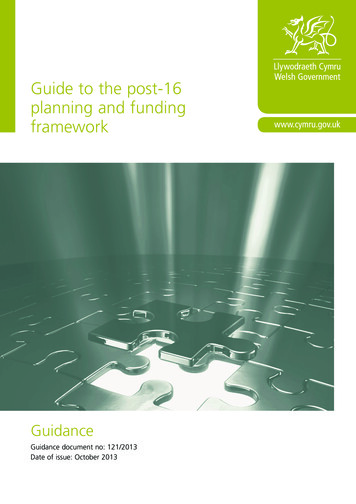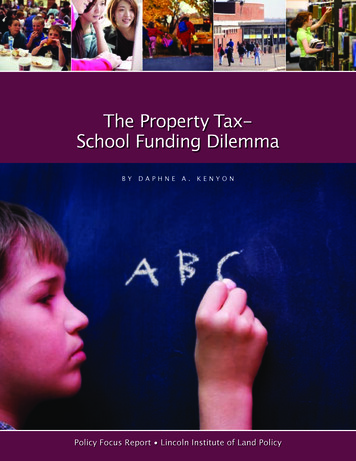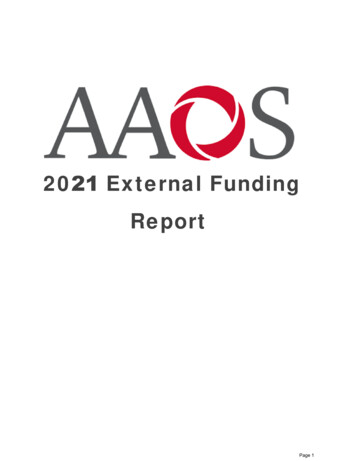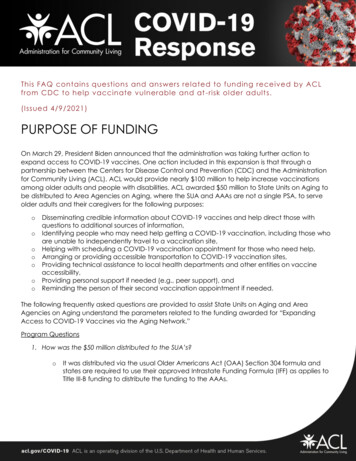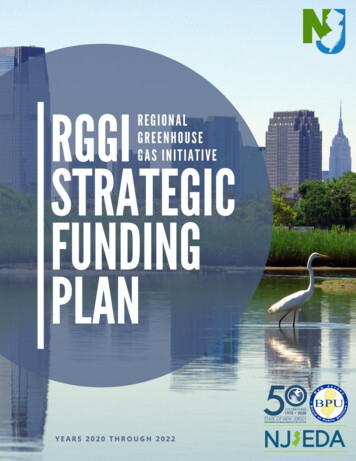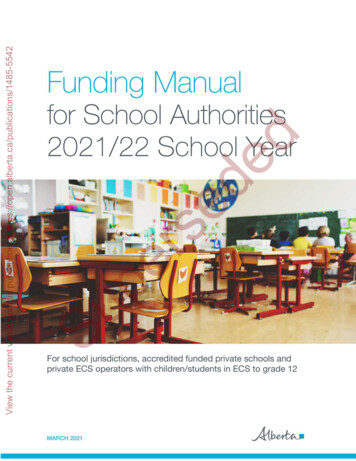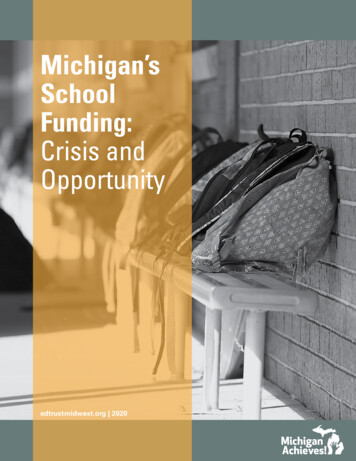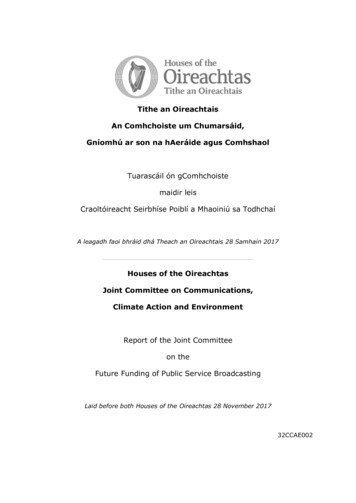
Transcription
Tithe an OireachtaisAn Comhchoiste um Chumarsáid,Gníomhú ar son na hAeráide agus ComhshaolTuarascáil ón gComhchoistemaidir leisCraoltóireacht Seirbhíse Poiblí a Mhaoiniú sa TodhchaíA leagadh faoi bhráid dhá Theach an Oireachtais 28 Samhain 2017Houses of the OireachtasJoint Committee on Communications,Climate Action and EnvironmentReport of the Joint Committeeon theFuture Funding of Public Service BroadcastingLaid before both Houses of the Oireachtas 28 November 201732CCAE002
Tithe an OireachtaisAn Comhchoiste um Chumarsáid,Gníomhú ar son na hAeráide agus ComhshaolTuarascáil ón gComhchoistemaidir leisCraoltóireacht Seirbhíse Poiblí a Mhaoiniú sa TodhchaíA leagadh faoi bhráid dhá Theach an Oireachtais 28 Samhain 2017Houses of the OireachtasJoint Committee on Communications,Climate Action and EnvironmentReport of the Joint Committeeon theFuture Funding of Public Service BroadcastingLaid before both Houses of the Oireachtas 28 November 201732CCAE002
Report on Future Funding of Public Service BroadcastingTABLE OF CONTENTSBrollach . 3Preface . 41.Key Issue: The Funding Model – Short Term Solutions . 6Recommendation 1 - Fairness and Equity . 6Recommendation 2 – All Media Consumed . 6Recommendation 3 – Revenue Commissioners . 6Recommendation 4 – Proportional Allocation . 6Recommendation 5 – Restore Funding from Social Protection . 7Recommendation 6 – Consumer Price Indexation . 7Recommendation 7 – Retransmission Fees . 8Recommendation 8 – Independent Production Sector . 8Recommendation 9 – Public Service Media . 82.Key Issue: Consider alternatives to the existing licence fee - Long Term/ Structural Change . 9Recommendation 10 – Innovative Alternatives . 93.Introduction. 11Key issues from Stakeholders and Interested Parties . 144.Background . 23The Public Service Broadcasting (PSB) companies . 235.The Funding Model . 27Key points arising (summary) . 36Short term solutions . 39Longer term / structural change . 56B. The definition of Public Service Broadcasting . 62What is meant by ‘Public Service Broadcasting’?. 63Appendix 1: Minister Denis Naughten T.D. – Letter to Joint Committee reFunding of Public Service Broadcasting . 69Appendix 2: submissions from stakeholders . 72Appendix 3: Focus Group (findings / key points for discussion) . 251Joint Committee on Communications, Climate Action and Environment
Report on Future Funding of Public Service BroadcastingAppendix 4: Connect the Dots Insight Report . 252Introduction . 255The Design of the Event . 255Concept . 255Pre-Event Co-Creation . 256Pre-engagement . 256Live-Event Engagement . 257Post-Event Data-Mining. 257The Core: Re-imagining the consultation process . 258(ii) Dialogue . 258(iii) Dining . 258(iv) Dialogue. 258(v) Speakers. 258(vi) Closing - Sharing back and moving forward . 258The Event Schedule . 259Insights & Trends. 260How We Analysed the Data . 260Summary of Key Findings . 261Session A: Defining Public Service Broadcasting . 261Scene 1: Vision & Purpose . 261Think Big - what is the ideal state look like? . 262Who can Public Service Broadcasting provide value to? . 262Who can public service broadcasting benefit each of these? . 262Scene 2: Key Drivers of Change . 263What are the key drivers of change . 264What are the effects these have on public service broadcasting? . 265Scene 3: The State of Play . 266What is working?. 267What isn’t working? . 267Joint Committee on Communications, Climate Action and Environment
Report on Future Funding of Public Service BroadcastingWhat are the gaps? . 267What are the opportunities?. 267Are there any unknowns or uncertainties? . 268Are there other models to explore? Pros / cons? . 268Scene 4: Has the definition of PSB changed for you and how?. 268Session B: Funding Model . 270Scene 1: Improving and Innovating - what are potential funding mechanisms? . 270Scene 2: Funding Challenges & Solutions . 271Scene 3: Funding - Next Steps . 272Scene 4: Funding - Reflections . 273Session C: Panel Debate - Tech. & The Future of Public Service . 274Broadcasting . 274Audience Questions . 274Q1: How can we fund media production when free is the new norm? . 275Q2: Can PSB obligations ensure the home-grown content? . 276Q3: Could the Irish diaspora be a revenue stream for digital PSB? . 277Q4: What about removing the them BROADCASTING from PSB? . 278Audience Polls. 279Poll 1: Should ‘Broadcasting’ be removed from the term ‘PSB’? . 279Poll 2: Should the ‘TV license fee’ become the ‘Web/Media content fee’? . 279Conclusion: What will happen if no action is taken? . 280APPENDIX . 281Appendix 5: Consultative Forum Report attendees and methodology . 288Appendix 6: Orders of Reference – Joint Committee on Communications,Climate Action and Environment . 290A: Functions of the Committee – derived from Standing Orders [DSO 84A; SSO 70A] . 290B: Scope and Context of Activities of Committees. 293C: Establishment of Select Committees: Dáil Éireann Motion, 16 June 2016 . 294Committee Terms of Reference: Motion – Dáil Éireann 7 September 2016 . 295D: Establishment of Select Committees: Seanad Éireann Motion, 21 July 2016 . 296Joint Committee on Communications, Climate Action and Environment
Report on Future Funding of Public Service BroadcastingCommittee Terms of Reference: Motion – Seanad Éireann 29 September 2016 . 297E: Functions of the Joint Committee . 298Oversight of the Department . 298Public Service Management Act, 1997 . 299Engagement with Chairmen Designate of State Bodies under the Aegis of theDepartment . 299Oversight of Bodies under the Aegis of the Department - Communications,Broadcasting, Postal . 300Oversight of Bodies under the Aegis of the Department - Climate Action and Energy. 301Oversight of Bodies under the Aegis of the Department - Environment and NaturalResources . 302Appendix 7: Statutory Functions - Joint Committee on Communications, ClimateAction and Environment . 304Broadcasting Act 2009 . 304Broadcasting Authority of Ireland – Accountability to the Joint Committee . 304Proposing Members of the boards of BAI, RTÉ, and TG4 . 305Chairman and Director General of RTÉ and TG4 accountable to the Joint Committee. 305Media Mergers . 306Inland Fisheries Act 2010 . 306Proposing members of the board . 306Chairman and Chief Executive Accountable to the Joint Committee . 306Electricity Regulation Act 1999 . 307CRU (Commission for Regulation of Utilities) . 307Accountability of Commission to the Joint Committee . 307Communications Regulation Act 2002 . 308ComReg (Commission for Communications Regulation) . 308Laying of orders and regulations before Houses of Oireachtas. . 308Accountability of the Commission to the Joint Committee . 308National Oil Reserves Agency Act 2007 . 308Joint Committee on Communications, Climate Action and Environment
Report on Future Funding of Public Service BroadcastingAccountability of the Chief Executive to the Joint Committee . 308Appendix 8: Membership of The Joint Committee on Communications, ClimateAction and Environment . 309Dáil Select Committee on Communications, Climate Action and Environment . 310Seanad Select Committee on Communications, Climate Action and Environment . 311Committee Contact Details . 312Joint Committee on Communications, Climate Action and Environment
Report on Future Funding of Public Service BroadcastingJoint Committee on Communications, Climate Action and Environment
Report on Future Funding of Public Service BroadcastingBROLLACHHildegarde NaughtonCathaoirleach (Chairman)28 November 2017Joint Committee on Communications, Climate Action and EnvironmentPage 3
Report on Future Funding of Public Service BroadcastingPREFACEPublic service broadcasting (PSB) involves public sector funding of television, radio andother types of electronic communications media and is considered to be a “public good”which provides a high quality information service to society as a whole.The committee believes that the provision of balanced, impartial, well-resourced andindependent public broadcasting services are fundamental to our democratic society,particularly with the advent of “fake news”.However, the current funding model is not fit for purpose in today’s highly technologicaladvanced society where television sets are no longer the only method of media contentviewing.Changes in communications technology, the availability of broadband, and newapplications including social media make alternative channels available to users, withoutcontributing to the cost of quality Irish (and international) media content.In addition, revenue is also being lost through TV licence evasion, and “Opt Out”advertising.As part of its 2016 Work Programme, the Joint Committee decided to carry out electiveresearch on the Future Funding of Public Service Broadcasting followed by a publicconsultative process to investigate possible viable alternative funding models.This involved: Inviting submissions from stakeholders and members of the public; Hearing evidence from various stakeholders; Running a Focus Group session; Running an on-line questionnaire; Holding a Forum on Public Service Broadcasting in Dublin Castle with invitedstakeholders.Based, on the evidence presented to the committee by individuals, officials and variousstakeholders, the committee makes the recommendations included in this reportincluding: Responsibility for the TV licence fee collection to be handed to the RevenueCommissioners Charging to be expanded to include every household in the State Concessions to Old Age pensioners and others to be maintained Public Service Broadcasters to be permitted to charge retransmission fees tosatellite, cable and Internet service providers
Report on Future Funding of Public Service BroadcastingAs emphasised by stakeholders, the Committee believes that it is imperative thatrealistic timeframes are set down to implement these recommendations.In June 2017 the Minister for Communications, Climate Action and Environment, DenisNaughten T.D., requested the committee to scrutinise: the General Scheme of a Broadcasting (Amendment) Bill 2017 and retransmission fees.The joint committee decided to select the draft bill and the retransmission fees for prelegislative scrutiny in tandem with its consideration of the Future Funding of PublicService Broadcasting, and that report will be published shortly.I would like to take this opportunity on behalf of the committee to thank our consultantsConnect the Dots and Factory of Thought for the excellent manner in which theymanaged the Focus Group and the Forum on the Future Funding of Public ServiceBroadcasting.The report represents the broad consenscus of the committee however there weredissenting views from some members.I would also like to thank all the individuals and groups who assisted and contributed toour consideration of this subject, including those who made submissions as well as thosewho appeared before the Joint Committee.Finally, I would like to thank the members of the Joint Committee, especially themembers of the Working Group on Public Service Broadcasting, the Oireachtas Libraryand Research Service for their advice, and the Committee’s Secretariat for theirassistance in compiling this report.Hildegarde NaughtonCathaoirleach (Chairman)28 Samhain 2017
Report on Future Funding of Public Service Broadcasting1. KEY ISSUE: THE FUNDING MODEL – SHORT TERM SOLUTIONSRECOMMENDATION 1 - FAIRNESS AND EQUITYThe committee is conscious of promoting a sense of fairness and equity and recommendsthat the concessions which are presently available to current social welfare recipients areretained with any future funding model.RECOMMENDATION 2 – ALL MEDIA CONSUMEDThe committee recommends that a broadening of the applicability of the existing chargingregime be expanded to capture every household consuming media regardless of thetechnology used.Such a new regime would incorporate all households and not just those in possession of atraditional TV set as in seven other EU Member States including: Croatia Denmark Germany Romania Slovakia Slovenia and The United Kingdom.The committee recommends that the introduction of a non-device dependent public servicebroadcasting charge (household-based) is feasible, efficient and practical considering theincreasing threats to sustainability of current licence fee revenues.RECOMMENDATION 3 – REVENUE COMMISSIONER SThe committee recommends that the responsibility for the collection of the TV License Feecollection should be assigned to the Revenue Commissioners.RECOMMENDATION 4 – PROPORTIONAL ALLOCAT IONThe committee recommends that the existing proportional allocation of licence fee moniesbe scrutinised and revised to ensure that any monies realised by the implementation of theanti-evasion strategy are provided to a diversity of existing and new sources in a fair andequitable way. Priorities may includeJoint Committee on Communications, Climate Action and EnvironmentPage 6
Report on Future Funding of Public Service Broadcasting(a)restoring TG4 to more sustainable funding levels;(b)funding independent regional, local and community radio1 and TV (as directfunding for their public service obligations under the Broadcasting Act 2009).The committee recommends that the Minister establish a new scheme toassist these radio stations in the provision of local news and current affairsprogrammes.The scheme envisaged would be administered by theBroadcasting Authority of Ireland (BAI);(c)Amend the BAI Sound & Vision Scheme2 to allow funding for a wider categoryof broadcasting to be supported.RECOMMENDATION 5 – RESTORE FUNDING FROM SOCIAL PROTECTIONThe Committee recommends removing the Department of Employment Affairs and SocialProtection funding cap for RTÉ. Under The National Recovery Plan 2011-2014, funding forthe free television licence scheme was frozen at 2010 levels of expenditure for the durationof the Plan. While this decision had no impact on those benefiting from this scheme thefunding for RTÉ was initially cut by 4m.RECOMMENDATION 6 – CONSUMER PRICE INDEXATIONThe Committee recommends that the licence fee be reviewed two years after the RevenueCommissioners take over the collection of the licence, and every two years thereafter, inlight of the Consumer Price Index (CPI), noting that this is separate to the indexationformula3 as set out in the Broadcasting Act 2009.The indexation formula as set out in the Broadcasting Act 2009 will continue to assess RTÉ’sperformance.1The Broadcasting Act 2009 requires independent radio stations to have a minimum content of news and currentaffairs programming. This puts a financial strain on local stations that have limited budgets.Under Section 158 of the Broadcasting Act 2009, the BAI operate the Sound and Vision Scheme which supportsthe production and transmission of high quality programming based on Irish culture and heritage. The fund isallocated through television licence fee receipts. “The Sound and Vision scheme is a funding scheme for television and radiothat provides funding in support of high quality programmes on Irish culture, heritage and experience, and programmes to improveadult literacy.” www.bai.ie The Scheme objectives are: to develop high quality programmes based on Irish culture, heritage andexperience; Develop these programmes in the Irish language; Increase the availability of programmes referred to above toaudiences in the State; Represent the diversity of Irish culture and heritage; Record oral Irish heritage and aspects of Irish heritagewhich are disappearing, under threat, or have not been previously recorded, and; Develop local and community broadcasting. Toachieve these objectives, the Scheme offers grant funding to new television and radio programmes which deal with the themes of:Irish culture, heritage and experience; Improving adult or media literacy; Raising public awareness and understanding of globalissues impacting on the State and countries other than the State; and/or Any of the above in the Irish language.23Broadcasting Act 2009, Section 116(8).Joint Committee on Communications, Climate Action and EnvironmentPage 7
Report on Future Funding of Public Service BroadcastingRECOMMENDATION 7 – RETRANSMISSION FEES4The committee agree in principle to the introduction of retransmission fees and give RTÉthe capacity to negotiate with suitable platform providers (without prejudice to meetingtheir public service obligations)5’6. Under Section 114 (f) of the Broadcasting Act 2009 RTÉis obligated “to establish, maintain and operate a television broadcasting service and asound broadcasting service which shall have the character of a public service, whichservices shall be made available, in so far as RTÉ considers reasonably practicable, to Irishcommunities outside the island of Ireland.”The committee also consider that a provision be included to review the negotiation processin relation to retransmission fees.RECOMMENDATION 8 – INDEPENDENT PRODUCTION SECTORThe committee recommends that the expected additional funding achieved from thesemeasures would lead to increased funding to the independent production sector (as per theexisting 5-year BAI Review of Funding of Public Service Broadcasting7 2013-2018).RECOMMENDATION 9 – PUBLIC SERVICE MEDIAThe committee recommends that all references in legislation to ‘public service broadcasting’and ‘public service broadcasters’ should be changed to ‘public service media’ (PSM), whereappropriate.4Retransmission fees are fees paid by pay-TV platforms to broadcasters for the right to distribute (or retransmit)the broadcasters’ channels. In Ireland, the free-to-air channels RTÉ, TG4 and TV3 are distributed over a variety ofpay-tv platforms, including eir, Sky, Virgin Media and Vodafone. At present, these platforms do not pay thebroadcasters retransmission fees for carrying their channels and broadcasters do not pay for transmission of theirchannels by the platforms5RTÉ programming shall reflect regional diversity and include a significant range and proportion of indigenousprogramming broadcast schedules on all its channels which establish a benchmark for quality, range anddiversity in broadcasting on the island of Ireland. Department of Communications, Marine and Natural Resources,Public Service Broadcasting Charter, 2004.6Ibid.7Ibid.Joint Committee on Communications, Climate Action and EnvironmentPage 8
Report on Future Funding of Public Service Broadcasting2. KEY ISSUE: CONSIDER ALTERNATIVES TO THE EXISTINGLICENCE FEE - LONG TERM / STRUCTURAL CHANGERECOMMENDATION 10 – INNOVATIVE ALTERNATIVESFollowing on from our consultation process and Forum on the Future Funding of attheDepartmentofCommunications, Climate Action and Environment should undertake a detailed economicanalysis to assess the viability and sustainability of introducing (in the medium to longterm) innovative alternatives to the current funding model.The committee recommends that traditional media providers including national andregional newspaper providers are under financial pressure and operate now in a digitalenvironment.The committee agree that this area requires further analysis by thecommittee.Joint Committee on Communications, Climate Action and EnvironmentPage 9
Report on Future Funding of Public Service BroadcastingJoint Committee on Communications, Climate Action and EnvironmentPage 10
Report on Future Funding of Public Service Broadcasting3. INTRODUCTIONPublic service broadcasting faces a constantly changing broadcasting landscape. Theadvent and increasing permeation of digital technology and, more specifically, hardwareinto our daily lives has irrevocably changed traditional consumer viewing habits andtypical linear broadcasting services.However, the need for authoritative, impartial,indigenous, trusted and reputable public service media in Ireland has increasingimportance in a global media environment dominated by international media andcontent.However, traditional broadcasters are under increasing pressure from bothdomestic and foreign operators with competing demands on increasingly limited financialresources.The Joint Committee on Communications, Climate Action and Environment in itsexamination of the topic Future Funding of Public Service Broadcasting in Ireland foundthat the transition to a truly digital era poses significant challenges and opportunities fortraditional public service broadcasters. However, there is an increasing sense amongstindustry stakeholders of political inertia and of a notable hesitance to acknowledge andembrace recent change.Certain stakeholders also emphasised that any additionalfunding should be fairly and equitably distributed. The Joint Committee’s examination ofthis topic has also revealed that there is undoubtedly an urgent need for decisive actionthrough a dedicated, realistic and ambitious implementation strategy with specifictimeframes.Following receipt of a letter in October 2016 to the Joint Committee [Appendix 1] fromthe Minister for Communications, Climate Action and Environment, Denis Naughten T.D.the Joint Committee began examining this topic as a policy priority under its 2016 and2017 Work Programmes.The Minister in his letter requested that, following initial discussions by the JointCommittee in September 2016, that it consider examination the topic in greater detail,noting the following prevailing themes: The ability of the current funding model to enable public service broadcastersto fulfil their statutory objectives considering rapid technological change, mediaconsolidation (global entities following large-scale media mergers) increasingcompetition from abroad, changes to ‘traditional’ viewing patterns, changingtrends in advertising, increasing digitalisation and related decline in commercialrevenue streams and an increasing reliance on public funding to maintain currentservice provision levels; and How public service ‘media’ is defined, and how the core ethos of publicservice broadcasting can be maintained in a multiplatform digital medialandscape.Joint Committee on Communications, Climate Action and EnvironmentPage 11
Report on Future Funding of Public Service BroadcastingFor this report, the Joint Committee has focused on two principal and concise themes forexamination, as follows:1. Changes to the funding model for public service broadcasting; and2. Defining public service broadcasting / media (PSB/PSM) in the modern digitalera.The Joint Committee has conducted a detailed and comprehensive consultation exercisein its examination of this topic.This examination of the topic comprises threecomponents:Part A. Joint Committee / stakeholder meetingsIn 2016, the Joint Committee discussed both themes with a number of stakeholders, asfollows:Table 1: Public hearings related to the Joint Committee’s consideration of thetopic of Future Funding of Public Service BroadcastingDate21 September20168 November201622 November201611 July2017TopicEstimate for PublicServices 2016:Vote 29 –Department ofCommunications,Climate Action andEnvironment’Public ServiceBroadcasting:DiscussionPublic ServiceBroadcasting:Discussion (Resumed)Pre-legislativescrutiny of theGeneral Scheme ofthe Bro
Holding a Forum on Public Service Broadcasting in Dublin Castle with invited stakeholders. Based, on the evidence presented to the committee by individuals, officials and various stakeholders, the committee makes the recommendations included in this report including:



